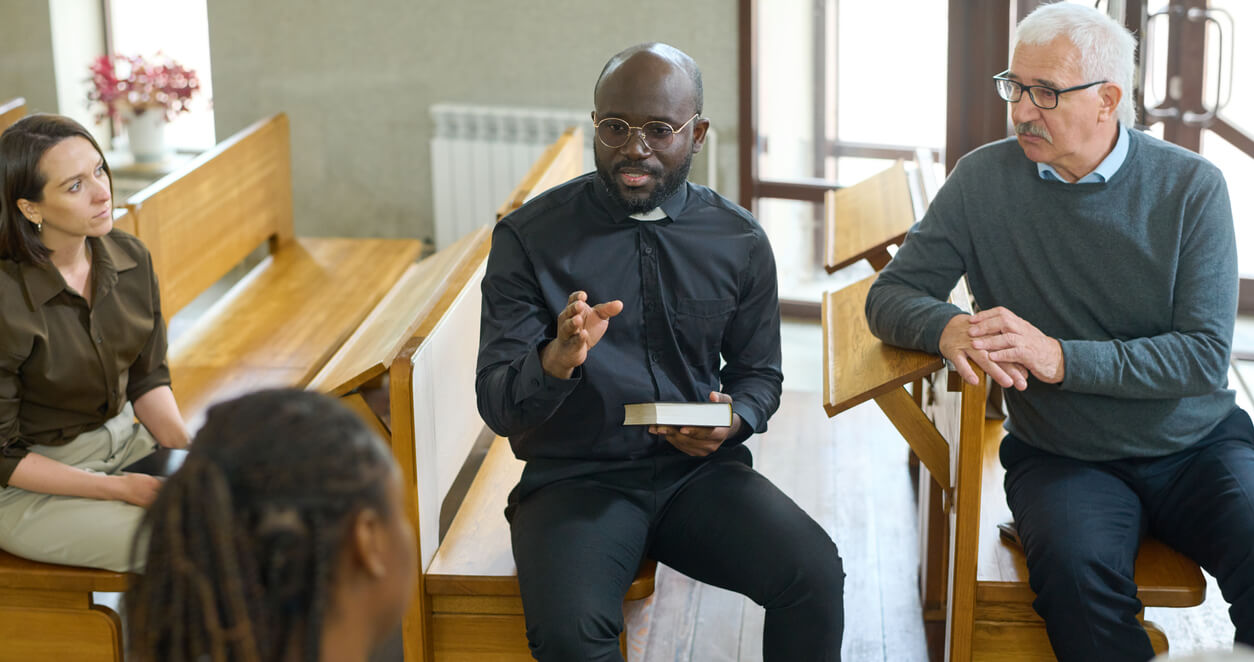Unless we work in the church or a faith-based organization, we’re often discouraged from bringing faith into the workplace. But this does not mean we can’t live out our faith at work — rather, our faith should inform our every action, especially as it pertains to interacting with others and following our moral compass.
For practicing Catholics, there are countless job opportunities that empower us to live into our values and even answer our vocational calling.
Benefits of Aligning Faith With Career
Remember: A job or career is what you do; your Catholic faith is who you are. No matter what you do for work, your attitudes, actions, and approach to work can reflect your beliefs. For example, those who follow Franciscan Catholicism would embody joy, acceptance of all types of people, a heart of service, and humility in everything they do.
Whether you work in a secular or religious profession, letting your faith inform your career choice carries significant benefits, including:
- The opportunity to fulfill your Christian mission of spreading God’s love to all you encounter
- The confidence that you are staying true to your faith and values
- The ability to represent Christ to others
- The chance to show your love and appreciation for God and his creation through the way you do your work
The good news is that you do not need to change careers to grow closer to your faith. Even if you work in a secular field that nonetheless aligns with your values, you can still nurture your faith by serving in church, joining Bible study or prayer groups, or participating in volunteer or missionary work.
7 Career Paths for Catholics
There is a wide range of careers that align with Catholic values. As such, the careers presented below carry varying salary expectations and overt connections to Catholicism.
The Catholic Church
First and foremost, there are many opportunities within the Catholic church, both in the priesthood and the laity.
Becoming an ordained priest is a lifelong undertaking, and the decision should be made with utmost consideration and dedication. Priests often earn a Master of Divinity degree before completing the process of ordination and taking vows of chastity and obedience. They serve as the leaders of their church, performing everything from delivering weekly Mass, to administering sacraments, to providing spiritual counseling, and even taking on managerial duties. They may also be members of a religious order, meaning that they take vows specific to that order and may live communally with other members.
Under the parish priest, there are positions for pastoral associates (also ordained), deacons, altar servers, catechists, and lay ministers. These unordained positions may be open to men and women, and often require specific training or spiritual formation. People in these roles may assist with tasks during services, provide religious instruction to others (catechesis), and even preside over services that do not involve sacred rituals.
Members of the laity can serve as youth ministers or lead spiritual formation classes for specific groups, such as women or teens. And every church needs administrative staff that ensures the organization runs smoothly. Job opportunities include receptionist, treasurer, volunteer and event coordinators, education director, and sexton.
Careers in the Catholic church:
- Priest
- Pastor
- Pastoral associate
- Deacon
- Lay minister
- Chaplain
- Catechetical leader
- Parish administrator
Education
Educators are needed in public and private schools, secular and religious institutions, churches and camps, and everything in between. Teachers have the great responsibility of helping students make sense of the world around them, to build and hone their interpersonal skills, and to meet challenges thoughtfully. There are thousands more jobs available in education beyond being a classroom teacher, such as in school administration or curriculum design.
In the Catholic church, educators are needed to lead catechesis and prepare pupils for Baptism. Catholic schools employ religious studies or theology teachers for grades K–12, but they also need teachers to cover core academic subjects like math and language arts. Since Catholic schools are private institutions, often affiliated with a specific religious order or parish, the academic curriculum can be informed by Catholic teachings and values.
Not only do educators prepare their students for future careers or academic pursuits, they can also teach students to care for others, to use their natural gifts for good, and to take responsibility for their actions out in the world. Whether imparted in a Catholic context or not, these life lessons uphold Catholic values of love, community, and mutual respect.
Education careers for Catholics:
- Catholic school teacher
- Secular school teacher
- Religious studies or theology teacher
- Catechetical leader
- Education administrator
- University professor
- Tutor
- Homeschool instructor
Healthcare
Healthcare professionals are often lauded as angels on earth for their tireless care and endless compassion in difficult situations. Doctors and nurses naturally mirror God’s love for humankind, caring for their fellows just as St. Francis celebrated in his Canticle of Creatures.
Healthcare professionals deal with serious matters of life and death, pain, trauma, existential questions, moral and ethical dilemmas, and high levels of stress. Catholic healthcare workers can find solace in their faith, using prayer and meditation to alleviate stress and following God’s word when faced with difficult decisions. Catholics may also choose to work at Catholic hospitals, at which they can provide care that more closely aligns with Catholic values.
While medical professionals attend to the physical body, hospital chaplains can attend to a patient’s mind and soul. Chaplains are considered part of a patient’s care team, delivering spiritual support aligned with each patient’s religious affiliation. Hospice chaplains, in particular, can offer great comfort to patients as part of their end-of-life care.
Humans aren’t the only ones who need medical care! In keeping with Franciscan tradition, many Catholics enter veterinary medicine to help their fellow creatures in times of need. The care veterinarians give their patients fulfills God’s ultimate will that we care for all life on this earth.
Healthcare careers for Catholics:
- Doctor
- Nurse
- Medical specialist
- Hospital or hospice chaplain
- Healthcare administrator
- Veterinarian
Careers for Catholics in the arts:
The Arts
The arts offer endless opportunities to proclaim and pay tribute to God’s glory. Music plays a prominent role in Catholic worship and provides many opportunities for professionals and volunteers alike, including cantors, music directors, performers, accompanists, and music ministers. Any of these roles may have a hand in coordinating, producing, and preserving the music intended for worship services. Cantors and religious music directors, especially, may hold a master’s degree in theological studies or music and receive additional training from their priest or pastoral associate.
In or outside the church, music, fine art, theater, and creative writing all offer ways to express one’s spirituality in a way that resonates with them. Utilizing our natural talents for good is also a way to fulfill our duties as Christians. The Scripture provides unlimited inspiration; artists may even find ways of expressing intangible or abstract concepts from Scripture through their medium; think of stained glass windows, the frescoes in the Sistine Chapel, or artistic representations of Christ and the saints.
By using the arts to explore or convey spiritual messages, artists can even engage young people or those who have grown distant from their faith in new and exciting ways.
- Cantor
- Performance musician
- Songwriter
- Fine artist
- Religious music director
- Music ministry
- Art therapist
- Playwright
- Poet
- Actor
Business
Business has historically had a complicated relationship with the church. People and organizations that value profit over ethics are diametrically opposed to the tenets of Catholicism, which challenges some Catholic business professionals to square their work with their faith.
Therefore, the world needs professionals in finance, technology, sales, and other for-profit industries who will make responsible decisions about their and their customers’ money, partner with similarly ethical stakeholders, and prioritize the welfare of their employees.
Pope Francis himself supports ongoing discussions around making business and finance more just and considerate. In Evangelii gaudium (The Joy of the Gospel, 2013), Pope Francis writes, “Business is a vocation, and a noble vocation, provided that those engaged in it see themselves challenged by a greater meaning in life; this will enable them truly to serve the common good by striving to increase the goods of this world and to make them more accessible to all.”
Similarly in Laudato si’ (2015), he writes that business “can be a fruitful source of prosperity for the areas in which it operates, especially if it sees the creation of jobs as an essential part of its service to the common good.”
Careers in business for Catholics:
- Financial advisor
- Business consultant
- Investor
- Chief Financial Officer
- Chief Operations Officer
- Corporate lawyer
- Entrepreneur
- Financial aid specialist
- Operations manager
- Philanthropic work
Nonprofit Sector
Outside of the church or a Catholic school, nonprofits and charities may be the most intuitive workplaces for Catholics. These organizations fundraise and solicit donations in support of their cause, keeping only enough money to operate and pay their staff. There are nonprofit organizations in every field and industry, ranging from education, to community welfare, public policy, science, technology, and the arts, just to name a few.
Nonprofits can be secular or faith-based, with the latter operating under and upholding the values of their guiding church or faith. Many nonprofits operate like a traditional business: they need executives, accountants, marketers, managers, tech support, event planners, et cetera. They also need volunteer coordinators, since much of the hands-on work might be carried out by people who donate their time to the cause. It’s important for nonprofits to have a deft marketing and outreach team that can make connections and amplify their message to the public.
See overview: University of San Diego – Master of Theological Studies
Careers in the nonprofit sector are available all over the country, across the world, and right in your backyard. There are faith-based organizations aligned with nearly every religion, denomination, and religious order in existence. Idealist is an excellent resource for finding jobs that contribute to making the world a better place for all.
Nonprofit careers for Catholics:
- Nonprofit director
- Director of donor relations
- Volunteer coordinator
- Researcher
- Analyst
- Marketing director
- Educator
- Skilled tradesperson
Doing the “Holy Work”
Of course, you can live out your faith no matter where you work, but it helps to know there are opportunities out there that allow you to be your whole self. There will always be work-related challenges that test your faith, which is why regular spiritual reflection, meditation, and community participation is necessary. Sometimes, it takes learning more about our faith to feel truly connected to Christ in everyday life.
Offered by the Franciscan School of Theology in partnership with the University of San Diego, the Master of Theological Studies – Franciscan Theology gives students from all walks of life the opportunity to explore their faith from an academic perspective. This 100% online program is led by experienced religious scholars, many of whom have dedicated their lives to serving others in the name of St. Francis of Assisi.
As any of these instructors will tell you, graduates of the MTS – FT program can apply their degree to work in any field — but to maintain an active, authentic relationship with your Catholic faith is the real “holy work.” As long as you live into your faith beyond the walls of the church, you are fulfilling your Christian duty as a baptized member of the Catholic church.
For more discussion on the role of faith in the workplace, please download our free resource Seven Applications Faith In the Workplace [With a Master of Theological Studies Degree].
To request more information on the online MTS – FT degree program, please connect with a USD enrollment advisor today.




